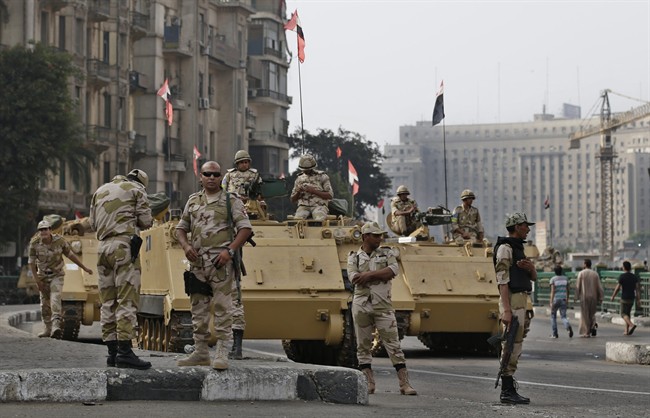BRUSSELS – Senior diplomats from the European Union debated a response Monday to a week of bloody violence in Egypt that has left nearly 900 people dead, including proposals to halt aid programs and suspend arms shipments.

The meeting of ambassadors came a day after top EU officials said the 28-nation bloc will “urgently review” its relations with Egypt.
While the EU lacks the military muscle that gives the U.S. a special position in dealing with Egypt, European nations are a major source of aid, loans, business and tourists for Egypt.
The EU and its member states last year pledged a combined 5 billion euros ($6.7 billion) in loans and aid for Egypt. European nations are also the country’s biggest trading partner, according to the Egyptian statistics office. The trade volume between the EU and Egypt reached almost 24 billion euros in 2011.
The flow of aid money, however, could be abruptly halted in the wake of the deadly clashes between security forces and supporters of deposed President Mohammed Morsi since last week.
Germany’s development minister, Dirk Niebel, told RBB Inforadio on Monday that Egypt will get “no further pledges this year” of aid from Berlin and added he has decided “that we won’t negotiate this year” on any debt relief for the country.
German Chancellor Angela Merkel on Sunday also floated the idea to halt previously approved arms shipments to Egypt as part of a co-ordinated EU response.
The diplomats meeting in Brussels weren’t expected to make decisions yet, but rather to take stock of the situation and lay the groundwork for a co-ordinated response, an EU official said. The person declined to be named because of the sensitivity of the closed-door talks.
The policy response will then likely be finalized by an emergency meeting of the bloc’s foreign ministers, possibly by the end of the week.
In the U.S., President Barack Obama has denounced the violence, cancelled joint military exercises and delayed the delivery of four F-16 fighter jets. But the White House has refused to declare Morsi’s removal a coup — a step that would require Obama to suspend $1.3 billion in annual military aid. Congress appears split on whether to suspend the aid, with some saying it would deprive Washington of leverage over those in power in Cairo.
The EU insisted in a statement Sunday that it is the responsibility of the Egyptian army and the interim government to end the violence and to embark on political dialogue to swiftly restore democracy, warning the people’s calls for fundamental rights “cannot be disregarded, much less washed away in blood.”
For Egypt, sun-seeking tourists from European nations flocking to resorts on the Red Sea and elsewhere account for more than 70 per cent of arrivals. The tourism sector has kept the ailing economy from suffocating since the 2011 Arab Spring protests that led to the ouster of autocrat Hosni Mubarak.
But Germany and others have issued travel warnings following last week’s violence, advising their citizens against unnecessary travel to Egypt. If beefed-up travel warnings from many EU countries were issued and kept in place, Egypt’s economy would nosedive — which could in turn fuel further social unrest.
“In view of the situation, the fewer Germans there are in Egypt, the better and safer,” said Foreign Ministry spokesman Martin Schaefer in Berlin.
Tourism provided direct or indirect employment to one in eight Egyptians in 2010, according to Egyptian government figures.
___
Geir Moulson in Berlin contributed reporting.
___
Follow Juergen Baetz on Twitter at http://www.twitter.com/jbaetz



Comments